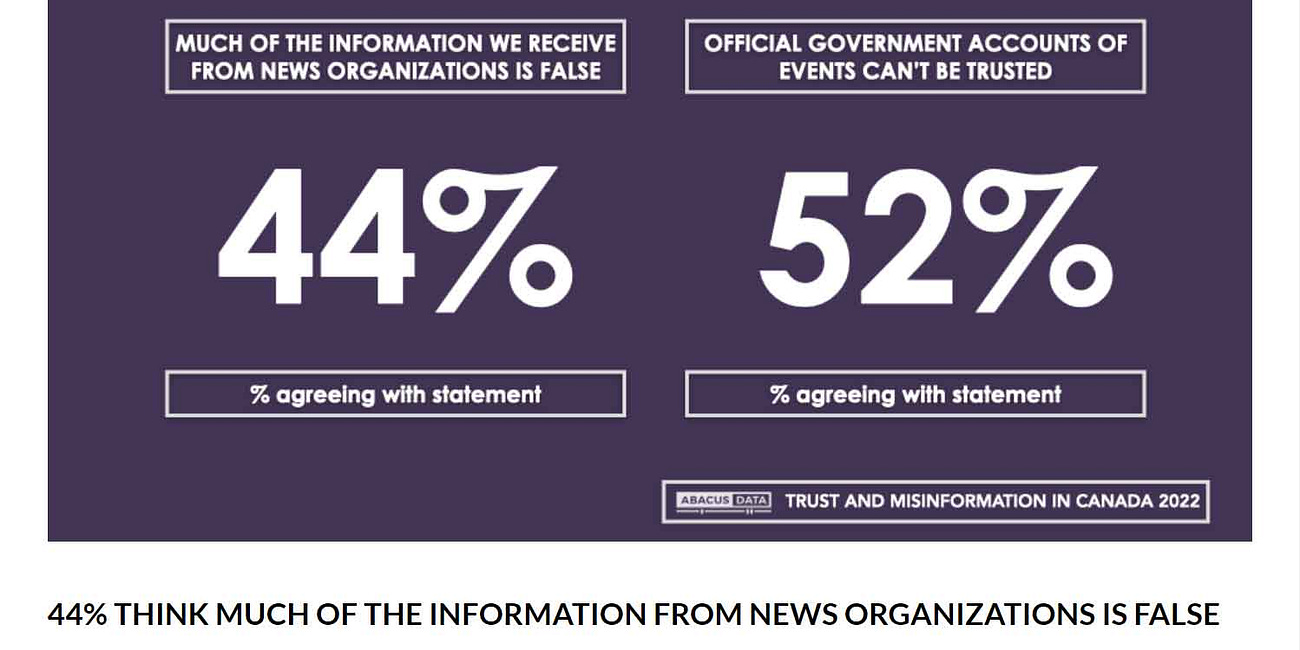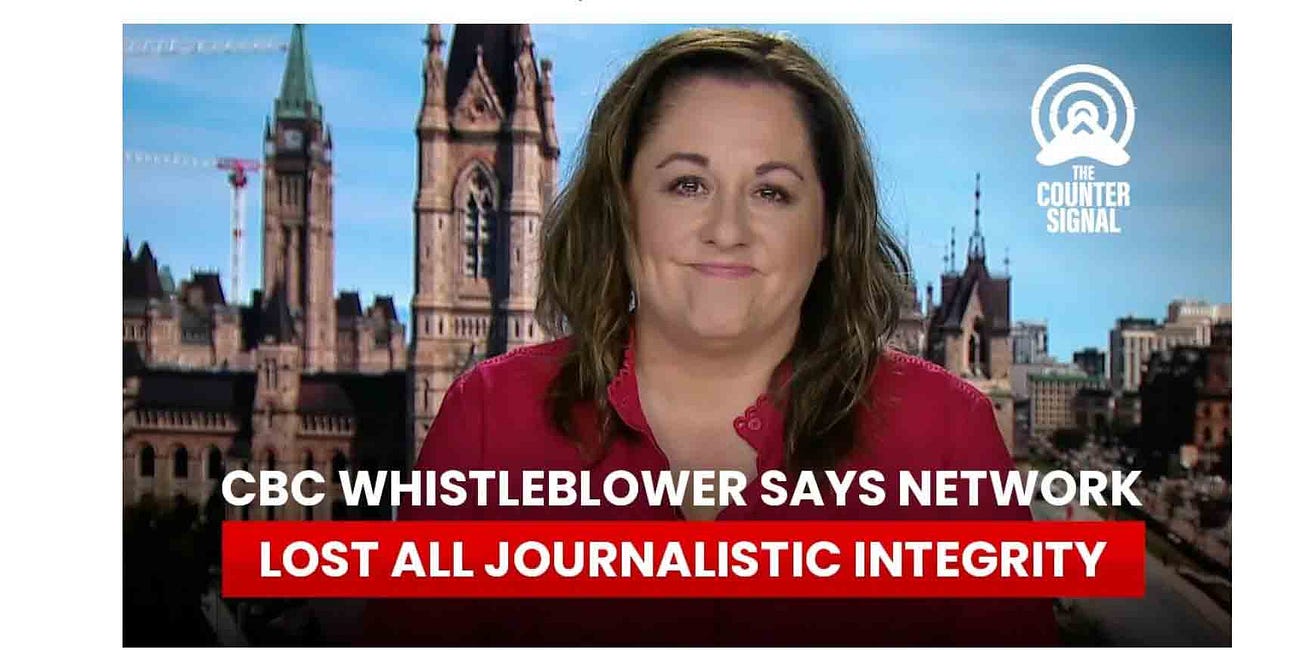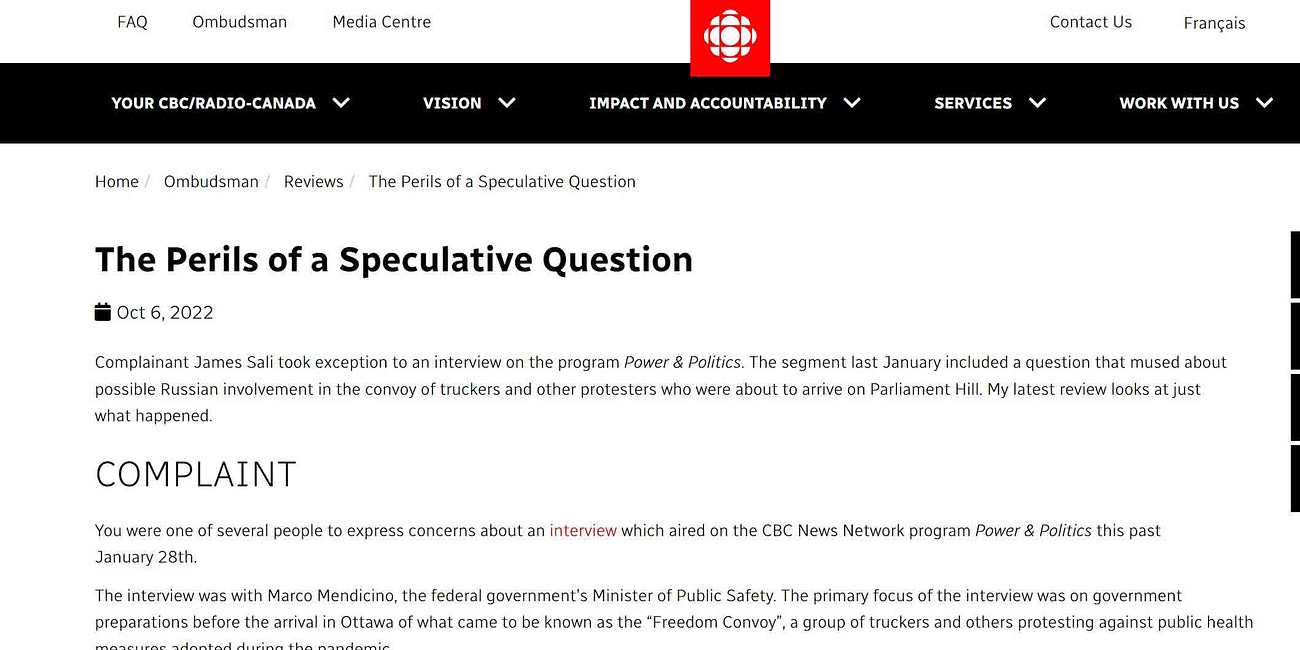“The metrics that we measure are public and tracked, and they're in all of our reports”. She may as well have said, “We can be as corrupt as we like if we bury it in reports that the plebs never read, and that’s the stupid plebs’ problem, not ours”. Whilst we may despise what she is saying, she is not wrong: she and her friends are parasitising the plebs and it’s not done entirely in secret. As I’ve said many times before, we need to smarten up and wake up from our semi-comatose stupified situation. The CBC is just a very public symbol of this situation, but it is just one part of something much bigger.
I hope that Scheer is just playing a political game here, and not missing the bigger point. Failing by their metrics is not the problem: their very existence, justified by any metrics they invent, is the problem. Their existence is an obscenity.
Context: for my non-Canadian readers, the Canada Broadcasting Corporation is the propaganda arm of the Canadian establishment. They pay themselves over $1,000,000,000 (one billion) every year to maintain their elite positions, using taxes taken from the plebs. And they give their executives millions of dollars in “performance awards” based on metrics they make up to justify their existence. This is in addition to the ad revenue they get from their buddies in private corporations (which also get billions of dollars in tax subsidies and corrupt contracts every year).
The CBC is just one part of a big corrupt money-making machine for an elite club. The upper middle classes support it because they hope that their children might one day succeed in finding a place in the club too (many do, of course, as the Psycho Nanny state grows and grows).
Until the majority of Canadians wake up to this, they will get poorer and poorer. It’s a parasitic system that will eventually collapse, of course. But not until the Canadian people are taken to the depths of a dystopian hell (think Stalin’s USSR, Mao’s China, Cuba, Venezuela, and so on).
Andrew Scheer (former Prime Minister of Canada): I'm sure we can probably agree on some metrics that reasonable people would use to measure the success of a broadcasting corporation. Would you agree that measuring viewership or ratings is a reasonable metric to measure the success of a broadcaster?
Catherine Tate (CEO of CBC): Yes, it’s one metric, so is usership.
Scheer: It’s one metric, an important one when you are talking about a broadcaster. You said that ad revenue was a major driver of whether or not you judge success. So would ad revenue also be a reasonable measure of success for a broadcaster?
Tate: It would be one of the variables, yes.
Scheer: Right, okay. So viewership, yes. Ad revenue, yes. Trust also, you know, whether or not people can trust what they're seeing on TV, especially when you run news outlets. You would agree, I hope, that trust in media would also be a measure of success.
Tate: Absolutely.
Scheer: Okay. And therefore errors would be another measure of success or failure. If there aren't a lot of errors that'd be a good thing. If there are a lot of errors, that would be a bad thing. Would you agree on that?
Tate: Well, I actually would put a different sp… response on error. I think error is a natural part of all journalism. And the fact that CBC, Radio-Canada, posts its corrections as quickly as we do is actually a demonstration of why we are trusted, unlike others who may not. So I would say that that's a trusted source.
Scheer: Wow. So the speed with which you correct your errors is the way that you measure performance at the CBC. Okay. Well, we've agreed that viewership is an important metric. We've agreed that ad revenue is an important metric. Trust as well. So fewer Canadians are watching the CBC than ever before. Viewership has plummeted to half of what it was when you became CEO in 2018. Ad revenue has also crashed. In fact, it was down 31% in just one year 2022 to 2023 and trust in media and especially in the CBC has also declined. The NDP talk about misinformation. The CBC has had to issue more than 100 corrections to grave errors in reporting. And that obviously has an impact on trust. So given the fact that on all these important metrics that you've agreed on, what justification do you have for issuing performance awards?
Tate: I want to correct a couple of your points, if I may, Madam Chair. First of all, the 30% drop in revenue was between an Olympics year and a non-Olympics year. And in fact, in the years you're describing, we had two Olympic Games. And so we have a much higher level of revenue, ad revenue, during those years. So that explains the drop there.
Scheer: Okay, so were ad revenues in 2023 higher than in 2022?
Tate: I would say they were flat. And that is what is part of what is happening in the industry. Television is in decline, not just at CBC. At CTV and Global, Television is in decline and people are moving to streaming.
Scheer: The CBC has almost half a billion dollars in real estate holdings across the country, big fancy buildings in downtowns across the country. You get over a billion dollars in tax payers money to be a television broadcaster, a radio broadcaster. When those metrics are down, how do you justify giving performance awards to people whose job it is to increase viewership, to increase ad revenue, to increase trust.
Tate: Madam Chair, if I may, I don’t agree with the premise. 79% of the Canadian public say it is important to have a public broadcaster like CBC or Radio Canada.
Scheer: Who commissioned that poll?
Tate: That is, those are our public perception surveys that we conduct.
Scheer: Oh, you conduct it, okay. So your polling tells you that Canadians like what you're doing.
Tate: By using a third-party léger survey firm. So, I'm sorry, if the argument is to try to say that we're no longer of value, all I would say is that's not what I hear from Canadians.
Scheer: What I'm asking about is the bonuses. When you give someone a bonus, and we've just agreed on the metrics that should be used to judge a broadcaster. When those metrics are down, how do you justify giving people, executives, big bonuses when they haven't achieved success by these metrics that we've agreed on?
Tate: As I pointed out, the metrics that we measure are public and tracked, and they're in all of our reports. So I'm afraid to say that trust is down. Trust is down across the entire media section. And it also affects politicians.
Scheer: Yes, when you misrepresent the truth, it does affect politicians.
Further reading:
























Share this post